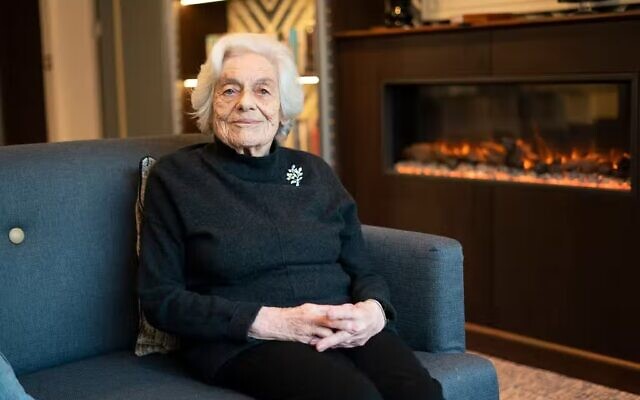Antisemitism rising because of a lack of Holocaust education, survivor warns
Vera Schaufeld believes it's important to continue talking about Nazi genocide to remind people of where antisemitism can lead.
Vera Schaufeld, a 92-year-old Holocaust survivor, came to England via the Kindertransport, a movement that was set up to evacuate Jewish children from Germany in the wake of Kristallnacht – a night of Nazi-coordinated violence in November 1938 which resulted in the destruction of hundreds of synagogues and Jewish properties across the German Reich.
Her parents remained in what was then Czechoslovakia and were sent to a concentration camp where they were later murdered.
Speaking ahead of Holocaust Memorial Day, she said Jewish people should be treated as individuals instead of as a whole group and that it is important to continue talking about Nazi genocide to remind people of where antisemitism can lead.
She told the PA news agency: “I think that unfortunately, antisemitism is more prevalent than it has been in the past because I think young people are no longer learning about the Holocaust as much as they did.
“Jewish people should be seen just as much as individuals, and not as a whole group, but understood that they have their own views and their own lives in the same way that every other minority has to be respected.
“And it has to be understood that their experiences and their lives are relevant to them and their families.”
Vera, who lives in north London, was born in Prague in 1930 and grew up in the small town of Klatovy just south of the Czech capital.
Her father was the head of the Jewish community in the town while her mother was of German origin and her grandmother moved in with the family from Germany in 1934 to avoid Nazi persecution.
Vera came to England soon after the occupation of Czechoslovakia and lived with a foster family in Bury St Edmunds, Suffolk. Her parents hoped to join her but were unable to secure a visa.
She said of her school life in Europe: “Our teacher said, ‘When there’s trouble, the Jews are the first to run away’ and I was devastated because I liked my teacher.
“And suddenly, I wasn’t Vera anymore. I’d become the Jews. And I think that statement of not seeing me as an individual certainly influenced my life.
“I got a letter from the Red Cross telling me that none of my family had survived. And I imagined, maybe this is what had happened to my family, that’s why they weren’t alive anymore. I just had to get on with the rest of my life.
“I learned later that what had actually happened was that my grandmother and my parents were taken to a camp in Czechoslovakia, which was called Theresienstadt.
“My grandmother had actually met her sister from Germany and the two of them both died of starvation by 1944.
“My parents were taken to a camp in Poland called Trawniki and that was a camp for training guards how to deal with Jews.
“And then after a time, when the German army began to advance in Poland, my parents, I think, had to dig their own graves and were shot and everybody in that camp was murdered. Nobody survived.”
Vera eventually trained as a teacher and spent some time in Israel where she met her husband Avram on a kibbutz.
They both returned to England where Vera continued teaching and she has since shared her testimony in schools and colleges.
In 2018 she was made MBE for services to Holocaust education.

Thank you for helping to make Jewish News the leading source of news and opinion for the UK Jewish community. Today we're asking for your invaluable help to continue putting our community first in everything we do.
For as little as £5 a month you can help sustain the vital work we do in celebrating and standing up for Jewish life in Britain.
Jewish News holds our community together and keeps us connected. Like a synagogue, it’s where people turn to feel part of something bigger. It also proudly shows the rest of Britain the vibrancy and rich culture of modern Jewish life.
You can make a quick and easy one-off or monthly contribution of £5, £10, £20 or any other sum you’re comfortable with.
100% of your donation will help us continue celebrating our community, in all its dynamic diversity...
Engaging
Being a community platform means so much more than producing a newspaper and website. One of our proudest roles is media partnering with our invaluable charities to amplify the outstanding work they do to help us all.
Celebrating
There’s no shortage of oys in the world but Jewish News takes every opportunity to celebrate the joys too, through projects like Night of Heroes, 40 Under 40 and other compelling countdowns that make the community kvell with pride.
Pioneering
In the first collaboration between media outlets from different faiths, Jewish News worked with British Muslim TV and Church Times to produce a list of young activists leading the way on interfaith understanding.
Campaigning
Royal Mail issued a stamp honouring Holocaust hero Sir Nicholas Winton after a Jewish News campaign attracted more than 100,000 backers. Jewish Newsalso produces special editions of the paper highlighting pressing issues including mental health and Holocaust remembrance.
Easy access
In an age when news is readily accessible, Jewish News provides high-quality content free online and offline, removing any financial barriers to connecting people.
Voice of our community to wider society
The Jewish News team regularly appears on TV, radio and on the pages of the national press to comment on stories about the Jewish community. Easy access to the paper on the streets of London also means Jewish News provides an invaluable window into the community for the country at large.
We hope you agree all this is worth preserving.






















